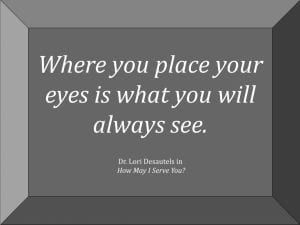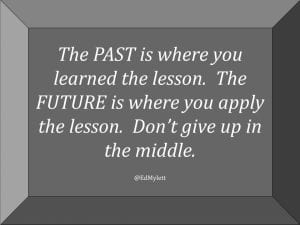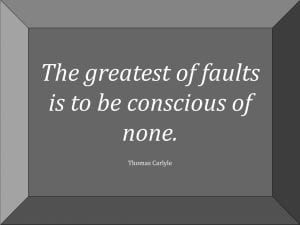Spring break is right around the corner for Fort Madison Community School District. We have one week until we get that much-needed week away from school. This is the time of year when our “windows of tolerance” can be nearly closed. We are frustrated with escalating student behaviors, data that is not moving in the direction we are working so hard for, and perceptions that our hard work is going unnoticed. Now, more than ever, it is important to remember two things: 1) We get to teach the students in front of us, not the ones we wish we had, and 2) Where you place your eyes is what you will always see.

Self Reflection
I have been reminded recently of the importance of placing our eyes in the mirror, first, when we are feeling frustrated with the above-mentioned issues. Engaging in self-reflection is common practice for educators. It happens naturally in a less-formal manner, and it is embedded in most professional development, in a more formal manner. In addition, we teach our students the process of engaging in self-reflection. We ask them to write a reflection about work they are most proud of, or reflect on their learning with exit tickets.
At its best, self-reflection leads to growth in our practice. We evaluate a lesson for its effectiveness, and think about how our instruction heightened or hindered learning. We use that evaluation to plan how to maintain strengths and improve weaknesses. At its very best, self-reflection occurs in tandem with colleagues, coaches or other teachers. Working with colleagues, we plan lesson sequences, execute lessons, and meet to reflect. In that way, we leverage the power of collaboration. Our thinking is extended with the support of colleagues, who ask questions to assist us in really “digging deep” in the reflection process.
At its worst, self-reflection leads to self-deprecation, where we reprimand and undervalue ourselves for our thoughts and actions, or for a lesson that did not go well. We may shoulder more blame than is necessary, which is a symptom of under-valuing self. When I get caught in this trap… and I often allow myself to… I have to remind myself that I am human. I also have to ask myself, “Would I say this same thing to others?” The answer is almost always, “Absolutely not!” I would not talk to colleagues the way I talk to myself, with statements that float through my head such as, “Why did you do that? This is completely your fault. That was a stupid thing to do! When are you ever going to learn?” Not healthy self-talk, but it sure shows up in my mind with a fair amount of frequency.
Teaching and leading is tough work. Being a human is tough work. Failure is inevitable, so we may as well expect it, seize it, and use it as an opportunity to grow. That growth begins with the individual.

We frequently see examples of self reflection in education, of looking in the mirror, digging deep, and making changes to our instructional practices so that all students are learning at high levels.
I’ve seen it over and over again in the past two weeks alone. It’s easy to miss this all-important self-reflection from our colleagues (and students!), but it is happening all of the time. The following is a shout-out to my colleagues who are digging deep, self-reflecting, and changing practice for OUR students:
- Shana – “I need to do a better job of giving positive feedback…”
- Kim & Wendy – “We need to look in the mirror if we aren’t getting the desired results…”
- Jennifer – “I should have been running a class-wide intervention a long time ago…” AND then acted on the regret by reaching out to our literacy consultant for help in getting a class-wide intervention up and running
- Maddie – reaching out, multiple times, for further support with a reading intervention
- Sarah & Olivia – “We need to do a better job of giving positive feedback… and let’s keep the coaching cycle going… and come into our rooms anytime…”
- Jackie – “We need to do a better job of intentional planning…”
- Deb & Corrine – “This podcast episode is a must-listen…”; Deb – “When can you come back to my room to help with______?” (She always asks this question about anything!)
- 1st grade team – confessing that lesson plans are not as intentional as they could be and recognizing the need to do better
- Charlotte – “I could do such a better job of planning read-alouds and using intentional planning for conversation during snack time…”
- Nita – asking for support with a tough group of 7th graders… and asking again when the first and second rounds of support didn’t get the job done
- Katey – “I’m wondering what I am doing wrong…” when reflecting on 4th grade behavior
- Mary – weekly emails asking for clarity around standards, curriculum implementation, proficiency scales…

And I’m not proposing that we beat ourselves up, only that we are perpetually wrapped up in a cycle of self-reflection and acting on recognized needs for change for the sake of our students. That’s what we are in the business for.
Literacy Leaders
I can’t say it enough: this work is incredibly tough. We will find ourselves taking time from our families to learn more, plan better, assess & give more effective feedback. But the tough work produces results, as we are reminded by folks like Angie Hanlin, a change-maker and superintendent in Thorp Wisconsin, Dr. Brittney Bills MTSS Coordinator in in Grand Island, Nebraska who recognizes the importance of sharing school successes, and Casey Jergens, kindergarten teacher in Minnesota, who was recently featured on Episode 142 of the Melissa & Lori Love Literacy podcast. These literacy champions are not teaching and leading groups of students who come to school ready to learn, who come to school proficient in standards from earlier grades, who come to school speaking English. They are teaching (and loving!) the kids who come to them… and making major gains!
John Hattie’s Work
In chapter seven of John Hattie’s landmark Visible Learning, we read about “The Contributions from the Teacher” as it relates to effects on student learning. Ten categories were analyzed; seven of the ten categories had an effect size (d) larger than the 0.4 hinge point, “a level where the effects of innovation enhance achievement in such a way that we can notice real-world differences…” At the risk of oversimplifying or minimizing the incredibly important findings in this chapter, Hattie’s concluding statements say it best, “…after seeing these results [of surveys conducted in New Zealand around student perceptions], the teachers are quick to change their practices.”
The final statement of the chapter says it all: “It requires them [teachers] to believe that their role is that of a change agent – that all students can learn and progress, that achievement for all is changeable and not fixed, and that demonstrating to all students that they care about their learning is both powerful and effective.”
As we head into spring break next week, as we look in the mirror before pointing fingers elsewhere, as we dig deep to change instructional practice, may we remember the incredible importance of those people leading their classrooms. I am beyond grateful for those colleagues and literacy leaders who have a firm grip on that mirror and who are willing to lead the work.